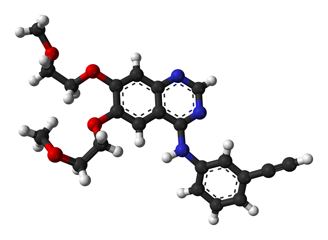Adding Erlotinib in HCC Fails to Improve Outcomes
In a phase III trial, erlotinib performed no better than placebo when added to sorafenib in treatment-naive patients with advanced hepatocellular carcinoma.
Ball-and-stick model of erlotinib

Erlotinib performed no better than placebo when added to sorafenib in treatment-naive patients with advanced hepatocellular carcinoma (HCC) in a randomized phase III trial.
At present, sorafenib is the only approved agent for advanced, unresectable HCC, but the epidermal growth factor receptor (EGFR) pathway has been implicated in HCC pathogenesis. “EGFR activation may interfere with HCC response to sorafenib, suggesting that EGFR inhibition may enhance tumor response,” wrote study authors led by Andrew X. Zhu, MD, of Massachusetts General Hospital in Boston. Because of that possibility, the EGFR inhibitor erlotinib was considered as a possibility to improve outcomes in these patients.
The new study included 720 patients with advanced HCC and underlying Child-Pugh class A cirrhosis, all of whom were naive to systemic treatment. The study was a multinational, multicenter, randomized trial, with 362 patients receiving sorafenib and erlotinib and 358 receiving sorafenib and placebo. Results were published online ahead of print on December 29 in the Journal of Clinical Oncology.
The median overall survival was not significantly different between the two groups, at 9.5 months with erlotinib and 8.5 months with placebo; this yielded a hazard ratio (HR) of 0.929 (95% CI, 0.781-1.106; P = .408). Median time to progression was also similar at 3.2 months with erlotinib and 4 months without, for a HR of 1.135 (95% CI, 0.944-1.366; P = .18). No subgroups showed any significant differences with regard to overall survival.
The objective response rate trended higher in the erlotinib patients, at 6.6% vs 3.9% (P = .102), though the disease control rate was significantly higher in the placebo group, at 52.5% vs 43.9% (P = .021). Safety was similar in the two groups; treatment-emergent serious adverse events (AEs) occurred in 58% of erlotinib patients and in 54.6% of placebo patients, and drug-related serious AEs and rates of treatment withdrawal were also similar.
Treatment duration was shorter in the erlotinib group, at 2.8 months vs 4 months. The authors wrote that this suggests an association between treatment duration and disease control rate, the causality of this relationship could not be determined.
“The lack of synergistic or additive effect suggests that EGFR signaling may not be pivotal in advanced HCC,” the authors concluded. “Sorafenib remains the standard of care for first-line treatment of advanced HCC.”